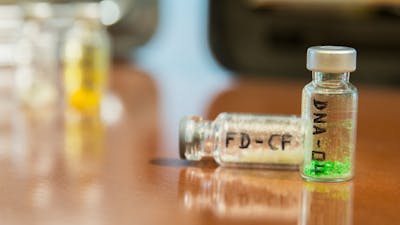Wyss Institute researchers have developed a biomolecular manufacturing method that can quickly and easily produce a wide range of vaccines, antimicrobial peptides and antibody conjugates while doing so anywhere, even in places without access to electrical power or refrigeration.

1/2 This portable biomolecular manufacturing method, developed by Wyss Institute Core Faculty member James Collins and his team, can produce a broad range of biomolecules, including vaccines, antimicrobial peptides and antibody conjugates, without power or refrigeration. The team envisions that the method’s freeze-dried components could be carried in portable kits (such as the mock kit pictured here) for use in the field anywhere in the world. Credit: Wyss Institute at Harvard University 
2/2 This technology has also been used to create BioBits, a biology kit that allows students of all ages to perform hands-on experiments that teach them the principles of molecular and synthetic biology, without the need for the expensive lab equipment that few classrooms can afford. Credit: Wyss Institute at Harvard University
The breakthrough could provide a life-saving workaround for making modern interventions available in remote areas. Today many field clinics around the world lack access to a “cold chain” of refrigeration that vaccines and other biomolecules typically require from the time of synthesis to administration. But using the Institute’s portable biomolecular manufacturing kit, clinicians could simply add water to pre-packaged, freeze-dried pellets in order to produce a wide array of active biomolecules.
The ability to synthesize and administer biomolecular compounds, anywhere, could undoubtedly shift the reach of medicine and science across the world.
The method works by embedding cell-free “machinery” and DNA instructions inside two kinds of freeze-dried pellets, one that contains the synthesis machinery and the other that can be customized to instruct production of a wide range of final products. The freeze-dried pellets are extremely stable and could be stored at room temperature for a year or potentially longer. If a vaccine or other type of biomolecular product was needed in the field, the portable manufacturing process would only require the appropriate pellets to be combined and rehydrated with water.
This technology is available for licensing.
